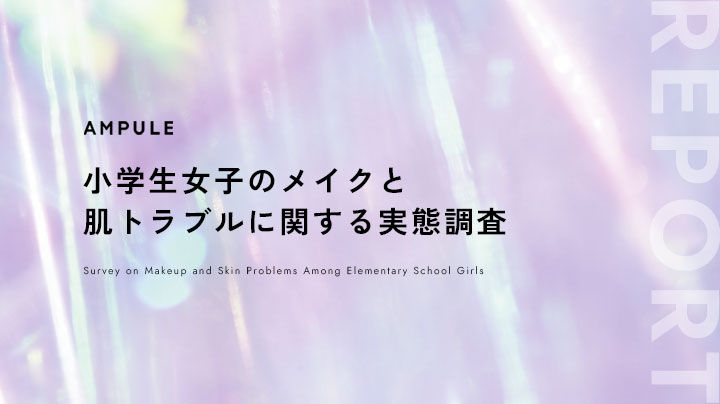ARTICLE
Insight
Various data on the differences between Japan and Korea<ampule magazine Vol.02>
This survey was excerpted from the November 2021 issue of ampule magazine Vol. 02.
To read the corresponding article and the full magazine, please visit the back issues of the electronic version of ampule magazine.
▼ampule magazine
https://ampule.jp/magazine/
ampule magazine Vol.02The future of J-Beauty will change through its ingredients.
The future of J-Beauty will change through its ingredients.We will consider the “now” and “future” of cosmetic ingredients based on interviews with skinfluencers, skincare brands, doctors and experts, as well as surveys of consumers.
<Survey Summary>
Trenders Research
Survey period: August 20~September 8, 2021
Survey target: 1103 women in their 20s~40s, evenly allocated by age (Japan: 603, Korea: 500)
Survey method: Internet survey

<Japan>
Emphasize effectiveness more than anything else 26.5%
Adopt (or want to adopt) cosmetic medicine 10.1%
Emphasize the effect on the mind as well as the skin 9.6%
Emphasize less burden on the skin 51.1%
Emphasize buzz and reputation 10.8
<Korea>
Emphasize less stress on skin 75.4%
Emphasize own knowledge and experience 27.2%
Emphasize effect on mind as well as skin 42.8%
Emphasize effectiveness above all else 62.2%
Also emphasize consideration for environment and animals 28.2%
While Japanese values are heavily weighted toward “less burdensome,” Korean values are a bit more diverse in their distribution. This suggests that skincare plays a role not only in beautifying the skin, but also in psychological and social aspects.
<Japan>
TV 34.5%
Instagram 28.4%
Shelves and displays in stores 20.9%
YouTube 20.2%
Twitter 17.6
<Korea>
Word-of-mouth from acquaintances/friends in real life 52.6%
YouTube 45.6%
Blogs 40.4%
Official information from companies and brands 31.6%
SNS of beauty experts 24.0

The number one source of information in Korea is “word-of-mouth from acquaintances and friends. Looking at SNS, Instagram is the most popular SNS in Japan, with 47% of Japanese 20-somethings using it, while only 25% of Korean 20-somethings use it, a marked difference. On the other hand, nearly 70% of Korean 20-somethings use YouTube as a source of information. Videos that explain ingredients in great detail are gaining popularity.
<Japan> Yes:18.2%
<Korea> Yes:48.4%
→Means of communication No. 1:SNS(44.4%)

According to ampule members who have lived in Korea and Japan, it is not unusual for people in Korea to express their opinions about products, not only cosmetics, to companies. This is said to be partly due to the national character of people who do not want to accumulate dissatisfaction, and companies may have to take this into consideration when responding, but it also allows them to reflect real consumer needs in their products in a speedy manner.
Planner / SNS Analyst, Trenders Inc.
Yukina Sato
After working as a content planner at a web production company, Yukina joined Trenders K.K. in 2014. Currently, as a communication planner, she provides marketing support to a wide range of industries including food and cosmetics, and specializes in analyzing consumer insights and SNS trends.





